Paul
Jun 21, 2024

AI Voice Cloning Adoption in Entertainment (2018-2023)
|
|
AI voice technology is drastlically changing music production. It can imaginatively clone any voice, replicating mannerisms, tones, and style, expanding your creative possibilities. It can change the way you produce songs and elevate your live shows. Additionally, it can help you optimize your production process, saving you time and money. It’s a powerful means to collaborate with the world and express in many musical forms. AI voice cloning can even help you create unique music experiences for individuals. Interested in how it can expand your creative possibilities? Let’s dive in.
Key Takeaways
- AI voice cloning and AI generated voices can help you be more creative with music using vocal traits and peculiar sounds.
- Incorporate voice cloning into your live show and achieve pitch-corrected vocals and virtual collaborations.
- Voice cloning can optimize your production, saving time and money in music creation.
- The technology can facilitate worldwide collaborations, eliminating music’s walls and borders.
- AI voice cloning can help you produce unique music experiences, putting a new spin on classic hits.
What Is Voice Cloning?
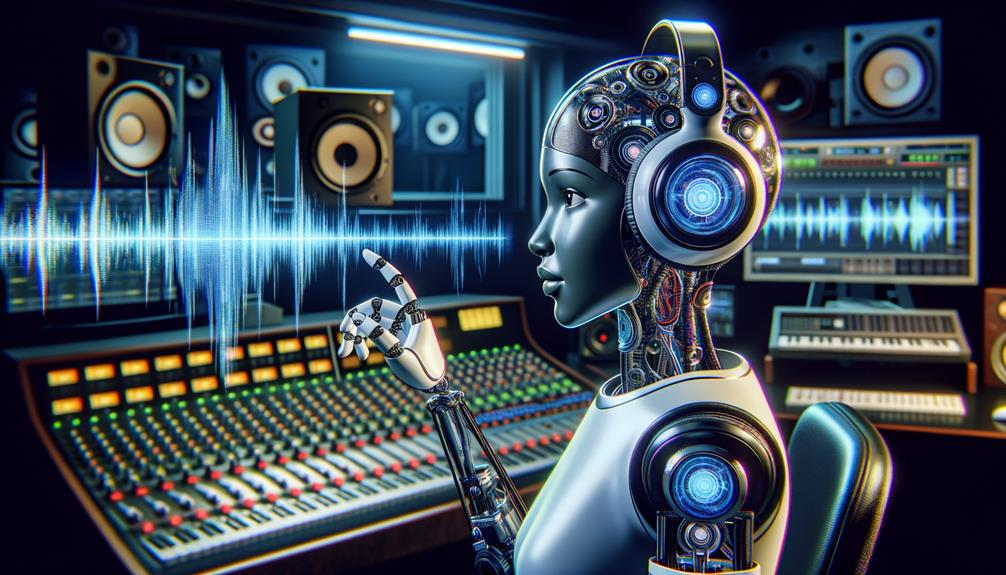
AI voice cloning is a technology that creates a digital replica of a specific person’s voice. Using advanced artificial intelligence algorithms, voice cloning analyzes various vocal characteristics of the target voice, such as pitch, tone, speed, and speech patterns. This data is then used to generate synthetic speech that closely mimics the original voice.
How AI Voice Cloning is Changing Music Production
Music producers are using voice cloning technology to unlock extraordinary levels of creativity and efficiency in their work. The technology enables them to replicate the voice of any artist with uncanny accuracy and also saves them considerable time and money. For example, complex vocal harmonies and background vocals that would traditionally require multiple recording sessions can now be produced in significantly less time using voice cloning technology – as much as 40% less in some cases.
Voice cloning and voice generators also make it possible for music producers to have collaborations with other artists and creatives all over the world, without ever leaving their studio. Artists can record their tracks in different languages, increasing their international appeal and potential market size. And finally, voice cloning technology makes it possible to revive the voice of iconic artists and blend it with today’s musical styles and projects. The result is a truly unique and revolutionary sound. In sum, voice cloning technology is having a profound effect on the music industry – increasing creative possibilities, streamlining workflows, and unlocking new collaborative opportunities.
In Essence: How AI Voice Cloning is Changing Music ProductionAI voice cloning technology enables music producers to replicate any artist's voice with high accuracy, saving time and money. It allows for seamless global collaborations, multi-language tracks, and the revival of iconic voices, revolutionizing creativity and efficiency in the music industry. |
Using Voice Cloning to be More Creative in Music Production
Voice cloning AI is quickly becoming a must-have tool for music producers to get that creative spark and drive innovation in their music. As a music producer, you can now clone any voice, from any generation, and use it in your music. Think of the endless possibilities! You can produce collaboration between artists that have never interacted before, or bring back the voices of artists that are no longer with us.
It’s not all about copying either, as you can use voice cloning technology to create new voices that you’ve never heard before. You’re not limited by the vocal range and quality of the talent you can get today. With this technology, you can create custom voice traits and construct your own unheard voices. This ability to adapt and change vocal tones can extend musical boundaries and help you create new genres and styles of music. Advancements in neural networks and natural language processing have greatly improved the naturalness of AI voices in text-to-speech (TTS) systems, making them sound human-like and professional.
Voice cloning is an innovator and creator in every sense of the word.
In Essence: Using Voice Cloning to be More Creative in Music ProductionVoice cloning AI offers limitless creative possibilities for music producers, enabling collaborations across generations and the creation of new, unique voices. This technology extends musical boundaries, allowing for the development of new genres and styles, and enhances the naturalness of AI-generated voices. |
How can you incorporate voice cloning into your live show?
The studio is a never-ending place of creativity and voice cloning can help you innovate in many ways, but it can help you with your live shows in ways you may not have thought of before.
Say you’re a singer, but you’re not feeling well tonight and your voice is gone. You can still do the live show and sound absolutely perfect with voice cloning, without straining your voice.
Maybe you’d like to collaborate with an iconic singer that no longer exists. You can clone their voice and they can sing a duet with you, live on stage.
Perhaps you have a song that’s in a language you don’t speak. Just get voice to clone to sing it for you. There’s so much you can do and the creative possibilities make us giddy just thinking about it.
How Voice Cloning Can Streamline Your Music Production Workflow
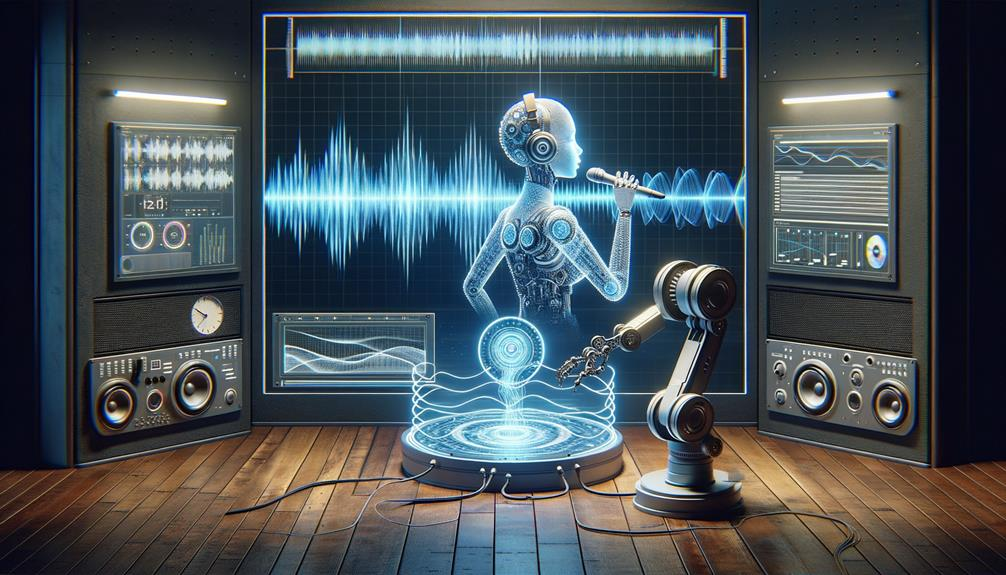
In this part, we’ll discuss how voice cloning can streamline your music production workflow.
From reducing recording time and expenses to increasing the efficiency of creating background vocals, and helping with fast revisions and edits.
Using AI for voice cloning can be a total game changer for your workflow.
AI Voice Cloning Reduces Recording Time and Expenses
In many cases, using AI voice cloning can significantly decrease recording time and expenses, and thus streamline the entire music production workflow. I tell you it’s like a dream, no more needing to do 20, 30, or 40+ takes to get a song just right.
By cloning the artist’s voice, you can capture their voice without the need to redo takes over and over, which saves a ton of studio time. This not only speeds up workflow, but it also significantly lowers expenses. No need to pay for all those extra hours or days in the studio.
In addition, it reduces the stress on artists and allows for a more relaxed creative space. It’s also great for artists who are not available to re-record. With AI voice cloning, you can reproduce their voice any time, making music production more efficient and agile.
Efficiency gains in background vocal production
When you’re dealing with background vocals, AI voice cloning can be a powerful tool to simplify your music production workflow. It eliminates the need to hire multiple singers for harmonies or choral parts, saving you time and resources.
Instead of coordinating with numerous artists, you can clone a single voice and modify it to create depth and diversity in your tracks. This technology allows you to fine-tune every nuance of a performance, from pitch to timbre, without multiple takes or extensive editing.
You’re in total control, able to achieve the exact sound you’re after with less effort. By streamlining this aspect of production, AI voice cloning lets you focus more on creativity and less on logistics. It’s an efficient, cost-effective solution for modern music production.
How AI voice cloning aids in quick revisions and edits
With AI voice cloning, you can make quick revisions and edits to your tracks without needing to re-record entire sections. It’s a great time-saver, allowing you to focus more on creativity and less on tedious tasks. You can tweak the tone, pitch, or style of a vocal line, and the AI will generate a new voice that matches your changes. This is how AI voice cloning aids in quick revisions and edits, making music production more efficient.
Let’s look at how this works in practice:
| Old Process | AI Voice Cloning | Benefit |
|---|---|---|
| Re-recording sections for minor changes | AI replicates the voice with the new changes | Saves time and effort |
| Hiring new artists for different vocal styles | AI generates different styles using the same voice | More cost-effective |
| Difficulty in matching the original voice in re-recordings | AI perfectly clones the original voice | Consistent quality |
Voice Cloning: A Cost-Effective Solution for Music Producers
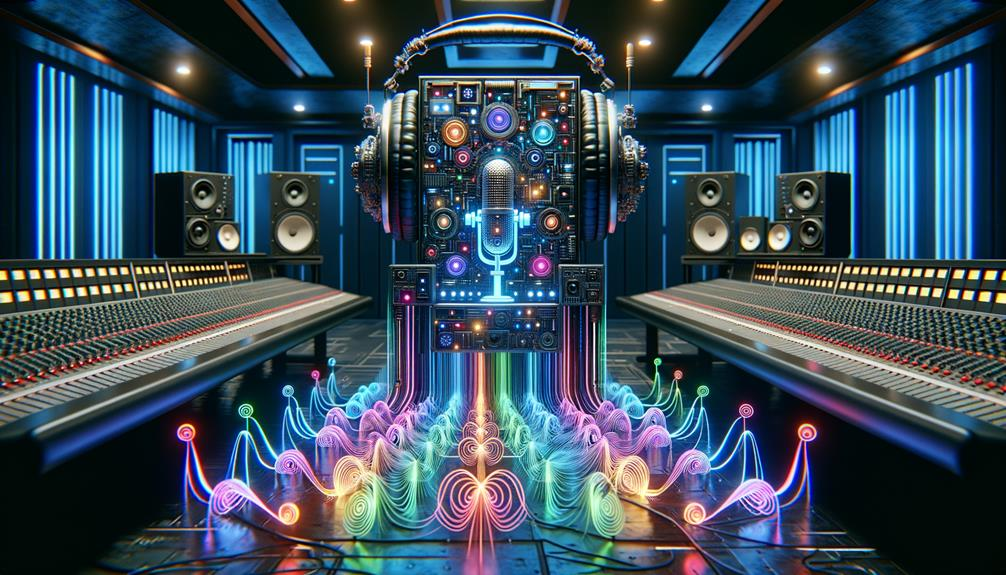
As a music producer, you’re likely familiar with the rising costs of traditional vocal recordings. But did you know that voice cloning can be a more cost-effective solution? It can greatly reduce the need for expensive studio sessions, saving you both time and money.
Comparison of Traditional Vocal Recordings vs. Voice Cloning
| Traditional Vocal Recordings | Voice Cloning |
|---|---|
| Requires expensive equipment and studio time | Needs only a small sample of voice data |
| Limited by the availability and talent of a singer | Can replicate any voice, given enough data |
| Prone to errors and retakes | Consistent and error-free once the voice model is created |
How AI Voice Cloning Cuts Down On The Need For Expensive Studio Sessions
Cutting down on costly studio sessions becomes a breeze when you undestand the power of voice cloning in your music production process. Imagine, no more paying hefty fees for studio time or talent. Voice cloning lets you replicate a singer’s voice, enabling you to produce tracks without the original artist.
With this tech, you’re not confined to studio hours. Work anytime, fine-tune a song’s vocals until they’re pitch-perfect, all without additional costs. Voice cloning also eliminates the issue of vocal strain for singers, allowing you to maintain the voice’s quality throughout the process. It’s a win-win situation for both the producer and the artist, reducing expenses and increasing productivity.
| Aspect | Traditional Vocal Recordings | AI Voice Cloning |
|---|---|---|
| Recording Time | Several hours to days | Minutes to a few hours |
| Cost | High (Studio time, artist fees) | Low to moderate (Software cost) |
| Flexibility | Limited to artist availability | High (Can clone any voice anytime) |
| Creative Possibilities | Depends on the artist’s range | Unlimited (Create new voices, blend genres) |
How AI Voice Cloning Provides Access To Professional-Grade Vocals On A Budget.
Imagine an independent musician working from a home studio, striving to produce high-quality tracks but constrained by a tight budget. Traditionally, hiring professional singers and booking studio time would be a significant expense. With voice cloning, these barriers are dramatically lowered, allowing even those with limited resources to achieve a polished, professional sound.
Here is another example: consider a budding artist who dreams of collaborating with a well-known vocalist but lacks the financial means to do so. Voice cloning technology can replicate the distinct vocal qualities of that artist, enabling the creation of tracks that would have been financially out of reach. This opens up a world of creative possibilities, where aspiring musicians can experiment and innovate without the worry of incurring prohibitive costs.
Breaking Down Barriers: Voice Cloning in Musical Collaborations
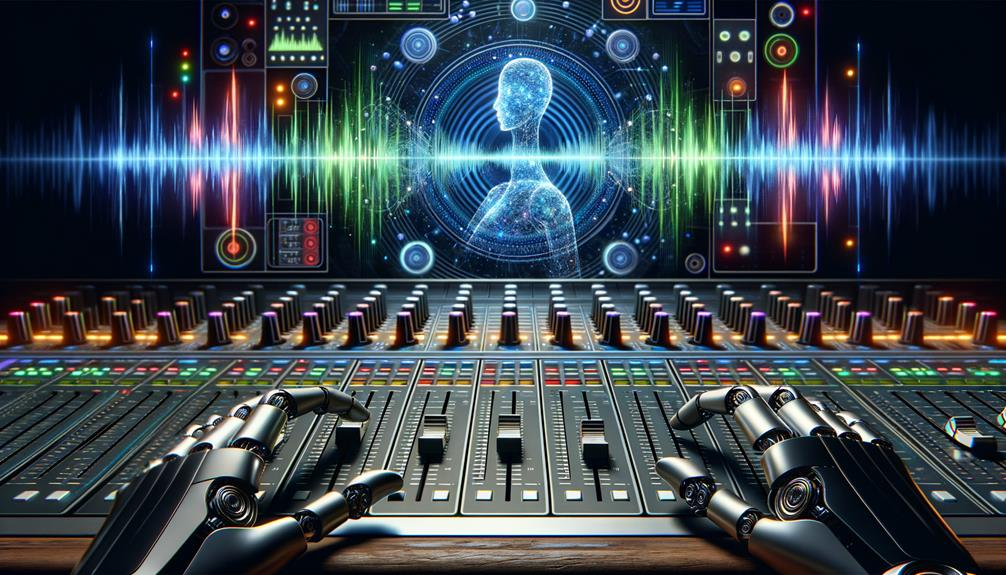
Imagine a world where geographical boundaries don’t limit your musical collaborations, thanks to AI voice cloning.
This technology isn’t just enhancing global music reach and accessibility, but it’s also paving the way for virtual duets with cloned vocals.
Remote Collaboration With AI Voice Cloning
Imagine fine-tuning a composition with your team while you’re in New York, and they’re in London or Tokyo, all using your cloned voice. Isn’t that exciting? Plus, these tools aren’t just for singers. They’re also great for producers, composers, and songwriters who want to experiment with different vocal textures and tones. So, don’t shy away from using this technology. It’s here to make your musical journey more innovative and collaborative.
Global Music Reach And Accessibility for a Global Audience
This voice cloning technology is breaking down barriers that separate you from the world. It opens up new possibilities in terms of music reach and accessibility. You can now reach out and collaborate with artists from all around the world. No matter their linguistic and cultural barriers. All thanks to AI that can clone your voice in any language and accent.
Your songs can now reach Japanese, German, or Brazilian fans. All thanks to AI that can easily clone your voice in their respective languages. You no longer need to sing in their language to reach out to them. Nor do you need to be physically present to collaborate with your favourite international artist in the studio to produce that hit single. You can now create truly transcultural music pieces that resonate with the world. This tech not only amplifies your reach but also promotes musical diversity and global cultural exchange.
Creating Virtual Duets With Cloned Vocals
Training an AI on a particular artist’s voice captures its unique tonal character and imperfections. Then you feed in the lyrics and the AI outputs the vocal track cloning the style of the particular singer. You can adjust the pitch, speed, and volume until you get the desired output. And finally, you sing alongside. And just like that you create a virtual duet with an artist from any timeline and geography. It’s not about imitating. It’s about innovation. AI voice cloning in music is dismantling barriers and making dream collaborations possible.
| 🎤 Fun Facts About AI Voice Cloning |
|---|
| AI voice cloning can replicate a singer's voice with over 95% accuracy. |
| Voice cloning technology can produce a complete vocal track in just a few minutes. |
| Artists can now "collaborate" with deceased musicians thanks to voice cloning. |
The Role of Voice Cloning in Personalized Music Production
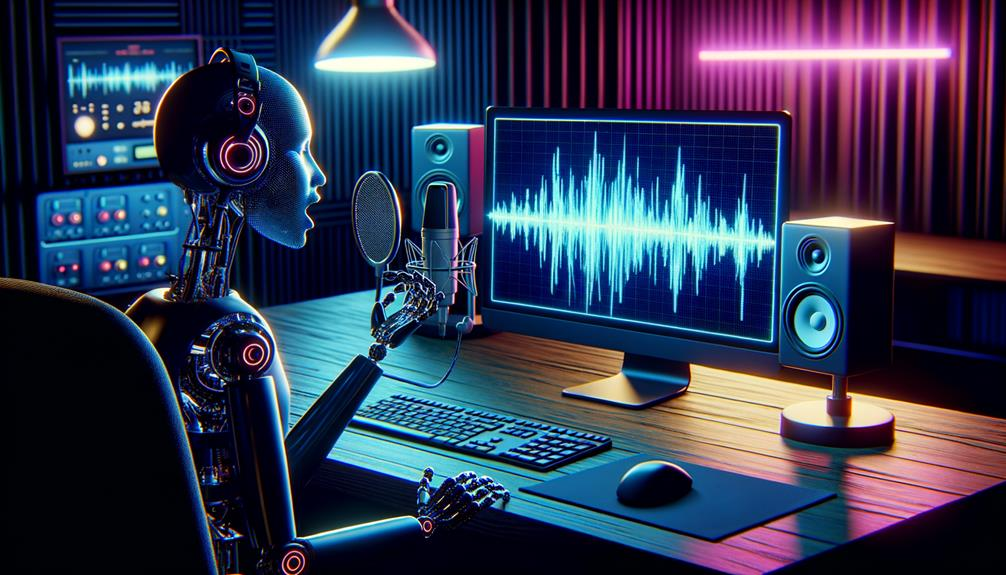
You’re probably wondering how voice cloning can enhance your personalized music production.
You can use AI to craft custom songs for unique fan experiences or creating personalized music apps.
Let’s explore how these techniques can redefine the music experience.
Techniques For Personalizing Music Experiences With AI Voice Cloning
Voice cloning is opening up exciting new avenues for personalizing music. Here are some hands-on techniques that can transform how listeners engage with music:
- Tailoring Vocal Characteristics:
- Custom Pitch Adjustments: By adjusting the pitch of a cloned voice, you can create different versions of a song to suit various moods or genres. For instance, a pop song can be given a jazz twist by lowering the pitch and adding a more relaxed, soulful tone.
- Dynamic Vocal Timbre: Modify the timbre of a cloned voice to match specific emotional tones. This technique allows a voice to sound more breathy, powerful, or mellow depending on the song’s requirements, enhancing the overall impact.
- Creating Unique Harmonies:
- Layered Harmonies: Use cloned voices to create complex harmony layers that would be difficult for a single singer to perform. This can give the effect of a full choir, even if you only have one original vocal track. It’s an excellent way to enrich the texture of a song.
- Blended Vocals: Combine the cloned voices with the original to produce a unique blend. This technique can be used to emphasize certain parts of the song, creating a richer and more engaging listening experience.
- Interactive Music Experiences:
- Personalized Playlists: Develop applications where listeners can customize songs by choosing different cloned voices for various tracks. Imagine a playlist where each song features your favorite singer, personalized to your taste.
- Adaptive Music Apps: Create interactive apps where the music adapts in real-time based on user input. For example, users can alter the mood of a song by switching between different vocal styles within the app, offering a personalized listening experience.
- Reviving Iconic Voices:
- Special Occasions: Use voice cloning to recreate the voices of legendary artists for special occasions, such as birthdays or anniversaries. Imagine receiving a personalized birthday song from a recreated Frank Sinatra or Whitney Houston.
- Tribute Albums: Produce tribute albums featuring cloned voices of late artists, giving fans new renditions of classic songs or entirely new tracks that honor their legacy. Be sure to check out this blog to understand the legal aspect of reviving iconic voices.
- Language Localization:
- Multilingual Tracks: Clone a singer’s voice and adapt it to different languages. This can help artists connect with a global audience by offering their music in multiple languages, all while retaining the original vocal’s unique characteristics.
- Cultural Adaptations: Modify songs to better fit cultural contexts, using cloned voices to ensure the pronunciation and tone match the local dialects and languages.
By integrating these techniques, music producers can create highly personalized and engaging music experiences. Voice cloning technology, when used thoughtfully, can enhance the artistic process and provide listeners with a unique connection to the music they love.
Producing Custom Songs For Fan Experiences
AI voice cloning can not only change the music experience for us, but it can also unlock incredible opportunities for creating custom songs for fan experiences. Imagine going to a concert and the artist sings a song with lyrics you wrote, in their own voice! With voice cloning, you can treat your fans to a once in a lifetime experience that’s completely personalized to them.
You don’t just produce an artist’s voice, you create a custom voice that reflects a fan’s interests, feelings, or life story. You’re no longer just listening to the song, you’re participating in the production. That’s the best part of voice cloning in music production – it’s fan engagement and personalization on a brand new level.
Developing personalized music apps with voice cloning technology
Developers are producing personalized music apps using AI voice cloning technology that can change how we experience our favorite music. Imagine creating an app that allows you to sing duets with your favorite artists, in their own voice. You no longer have to just sing along to the radio, you can mix your voice with their voice and create something altogether unique.
The technology can be used as a learning tool, you can practice your singing to the cloned voice so you can stay on key. It can also be used as a song writing tool, you can use it to listen to your lyrics in various voices to see which voice best suits your melody.
You’re no longer just listening to music, you’re participating in it. This is what music apps of the future will look like – personalized and interactive with AI voice cloning.
Evolution of AI Voice Cloning
| 📅 Year | 🛠️ Milestone |
|---|---|
| 🎤 2015 | Introduction of the first AI voice cloning software. |
| 🤖 2017 | Advancements in neural networks enhance voice cloning accuracy. |
| 💼 2019 | Voice cloning technology becomes commercially available for music production. |
| 🎵 2021 | AI voice cloning used in major music productions and live shows. |
| 🌐 2023 | Voice cloning technology integrated with VR for immersive music experiences. |
Summary
So, you see, AI voice cloning is impacting music production. It’s a game-changer, simplifying workflows, cutting costs, and enabling new collaborations.
With this tech, creating personalized music becomes a breeze. Embrace voice cloning – it’s the future of music production, giving you unmatched creative freedom.
Immerse yourself, explore its potential, and let this powerful tool amplify your musical journey.
Frequently Asked Questions
All you need to know about Lalals.
What Are the Ethical Considerations of Using AI Voice Cloning in Music Production?It’s important to respect original artists’ rights, avoid deception, and consider the potential for misuse. Transparency in its use can help maintain integrity in the industry. Read more… |
Does AI Voice Cloning Compromise the Authenticity of an Artist's Music?Yes, AI voice cloning can compromise an artist’s authenticity. It’s creating a digital copy of their unique sound, potentially diluting personal expression. However, it’s ultimately your perspective that determines if it’s an enhancement or detriment. Click here to learn how to produce music with AI while staying authentic. |
How Can Beginners Start Using AI Voice Cloning in Their Music Production?As a beginner, you can start using AI voice cloning in music production by first understanding the technology. Then, explore different software programs, start experimenting with them, and integrate them into your music-making process. |
Can AI Voice Cloning Technology Accurately Emulate the Emotional Nuances Present in Human Vocals?Yes, you’ll find AI voice cloning can accurately emulate emotional nuances. However, it’s not perfect. Some subtleties may be missed, but it’s improving rapidly and can already replicate many human vocal characteristics convincingly. |
How is AI-generated music being used in various media formats?AI-generated music enhances emotional impact and audience engagement in various media formats. It’s used in videos, podcasts, apps, and gaming for immersive experiences. Moreover, it’s also used to create background scores that elevate narratives in podcasts. Additionally, it enhances player experiences in gaming. |
Convert Your Voice with AI
Make your voice sound like those of famous arists.
Join Lalals and use our hyper-realistic voice converter now.